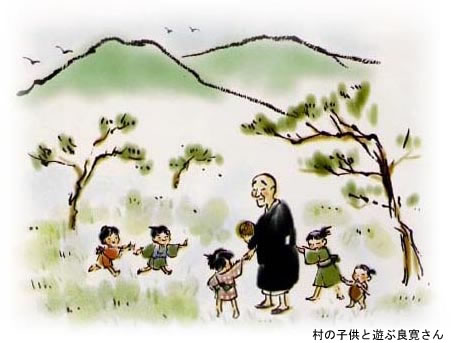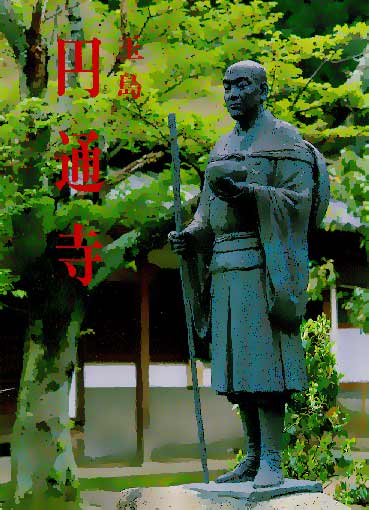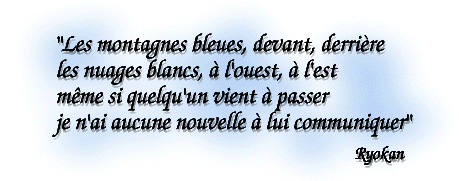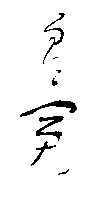
First days of spring - blue sky, bright sun.
Everything is gradually becoming fresh and
green.
Carrying my bowl, I walk slowly to the village.
The children, surprised to see me,
Joyfully crowd about, bringing
My begging trip to an end at the temple
gate.
I place my bowl on top of a white rock and
Hang my sack from the branch of a tree.
Here we play with the wild grasses and throw
a ball.
For a time, I play catch while the children
sing;
Then it is my turn.
Playing like this, here and there, I have
forgotten the time.
Passers-by point and laugh at me, asking,
"What is the reason for such foolishness?"
No answer I give, only a deep bow;
Even if I replied, they would not understand.
Look around! There is nothing but this.
RYÔKAN

Fresh morning snow in front of the shrine,
The trees! Are they white with peach blossoms
Or white with snow?
The children and I joyfully throw snowballs.
RYÔKAN
Neige fraîche du matin devant le temple.
Les arbres! Sont ils blancs de fleurs de pêcher
Ou blancs de neige?
Les enfants et moi lançons joyeusement des boules de neige.
The Priest Ryokan San (1758 - 1831)

Ryokan san was born in Izumozaki, a little south of Niigata city. He
became a priest at 18 and met his teacher Kokusen Roshi while Roshi was
traveling to various temples to teach. Ryokan san was so impressed that
he immediately left with Kokusen Roshi and returned with him to Entsuji.
There, he devoted himself to training and became Kokusen Roshi's closest
student. When Kokusen Roshi died, Ryokan san inherited the temple. But,
temple master's life did not suit him and he left, wandering around Shikoku
and Kyoto area for many years.
He returned to his home town and settled in a little hut, Gogoan, on
Mt. Kugami. There, he practiced takuhatsu (begging), and writing poetry
in his unique calligraphic style. Ryokan san loved children and often forgot
about this begging rounds while he engaged in games with them. He was extremely
gentle and was never known to raise his voice in anger or annoyance. His
kindness was legendary.
Once while he was away from his hut, a thief came and stole his few
possessions. When Ryokan san returned, the thief was just leaving and he
saw that one possession had been left behind. Ryokan san picked up the
cushion and ran after the thief to give it to him. Later he wrote this
poem:
The thief left it there
There in the window frame -
The shining moon.
When Ryokan san was 70, he met a nun named Teishin, and they fell in love.
She was 28 and also a poet. They met rarely, but exchanged some of the
most beautiful love poems in world literature during the three years they
knew one another. When Ryokan san was dying, Teishin was sent for and she
held him as he died. Because of her devotion to him, his poems have been
given to the world. Teishin collected and published his work until her
own death at about age 75.
Ryokan, de son vrai nom Yamamoto Eizo, est né en 1758 dans le
village d'Izumozaki de la province d'Echigo (actuelle Niigata), sur la
côte ouest du Japon.Une région de neige. Il naît et
va vivre à une époque où la paix règne au Japon.
A dix-huit ans, il décide d'entrer au monastère zen Kosho
ji et devient le moine Ryokan, qui signifie "bon et bienveillant". A vingt-deux
ans il devient disciple du maître Kokusen et reste douze années
à suivre son enseignement. Il étudie également la
poésie classique chinoise et japonaise ainsi que la calligraphie.
A la mort de Kokusen, Ryokan part en pèlerinage durant dix ans
et finit par trouver un ermitage, une hutte en chaume baptisée Gogo
an, ou il s'installe pour vingt ans.
Pour se nourrir, avec son bol et sa canne en rotin noir à laquelle
sont suspendus des anneaux en zinc il se rend dans les villages avoisinants
afin de mendier. En chemin, il joue à la balle avec les enfants,
discute et boit du saké avec les paysans, n'hésite pas à
se joindre aux fêtes champêtres. Il adopte pour second nom
de moine le sobriquet qu'on lui a donné, "Taigu", le Grand Fou.
Le rencontrer dit-on, c'est "comme si le printemps arrivait par une
journée d'hiver obscur".
Il meurt en 1831 à soixante-douze ans.
Ce poème est l'un de ceux qu'il a composés à Gogo
an, en chinois.

Contes
zen
Ryôkan, Le Moine au cœur d'enfant
Le Courrier du Livre |
| |
Ryôkan n'a pas laissé de notes précises
sur les événements de sa vie mais a légué,
à travers des textes poétiques et son admirable calligraphie,
un trésor de sagesse infinie.
Sur le ton du conte, le lecteur trouvera dans ces pages des anecdotes
qui lui permettront de rencontrer ce personnage exceptionnel inscrit dans
la mémoire du peuple japonais comme "le moine qui jouait à
la balle avec les enfants".
À l'écart du monde, dans son ermitage de Gogoan, Ryôkan
s'est tenu en silence. Aujourd'hui pourtant, l'écho harmonieux de
son existence touche chacun de ceux qui l'entendent. En suivant avec candeur
et sincérité la voie du dépouillement et de l'effacement
de soi, Ryôkan a incarné le Zen le plus pur.
Commander
cet ouvrage
|
|






